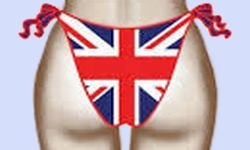 Despite the crack in the Union that threatened to appear as things got tighter and tighter in the run up to the vote, the headlines this morning are Scotland Says No. This result is both a golden example of democracy at its best, with the turnout a credit to the Scots, but also a reminder that democracy, though the best of those that have been tried, is not necessarily a good form of government. Instead, it is the least bad. The headlines are misleading: Scotland, the nation, is an abstraction that can no more decide its fate than it can decide what socks to wear in the morning. Instead, it is the people of Scotland who decided, individually, with the referendum result a binary outcome based on counts of millions of individual decisions. The outcome is pure democracy, rule by the majority in the interests of the majority, but as always, and starkly in this case, where for every fifty-five Scots who voted no, forty-five voted yes, there is a substantial minority for whom the outcome is not what they wanted; the result not, as they see it, in their interests. The Union Jack may still be intact, but the Union has been jarred.
Despite the crack in the Union that threatened to appear as things got tighter and tighter in the run up to the vote, the headlines this morning are Scotland Says No. This result is both a golden example of democracy at its best, with the turnout a credit to the Scots, but also a reminder that democracy, though the best of those that have been tried, is not necessarily a good form of government. Instead, it is the least bad. The headlines are misleading: Scotland, the nation, is an abstraction that can no more decide its fate than it can decide what socks to wear in the morning. Instead, it is the people of Scotland who decided, individually, with the referendum result a binary outcome based on counts of millions of individual decisions. The outcome is pure democracy, rule by the majority in the interests of the majority, but as always, and starkly in this case, where for every fifty-five Scots who voted no, forty-five voted yes, there is a substantial minority for whom the outcome is not what they wanted; the result not, as they see it, in their interests. The Union Jack may still be intact, but the Union has been jarred.
It remains to be seen whether the three Westminster sandwich men who so hastily chalked up this and that on their boards in the short days before the vote will deliver substance or straw. As more than one back bencher has said, the sandwich board men may be party leaders, but they are also accountable to parliament, where many unsettled and unsettling question remain, not just about Scotland, but also about England, Wales and Northern Ireland. If the offers turn out to be straw, it won’t be the first time sandwich men announcing the end of the world as we know it have had their cover boards blown.
For the NHS, Scotland Says No is, like democracy itself, the least bad result. A Yes vote, and independence for Scotland, would have ended the NHS, splitting it absolutely in two. The Scottish health service would mean as much to the English health service as say the French or the Irish health services do today. This is exactly, and very understandably, what the Yes voters wanted, because it would protect a newly independent Scottish health service from the deprivations and degradations forced on it by Westminster, but for the wider health service, in particular the larger English remnants, the threats would have been graver. Uncoupled from the sublime but stabilising influence of a Scottish health service still grounded in the founding principles of the NHS, an English health service would be freer, possibly to prosper, but much more likely to fly apart, like a meteor shower, sparks turning to dust. Instead, the Scots health service will continue to exert its gravity, and we shall all minimally but usefully be held together by it.
